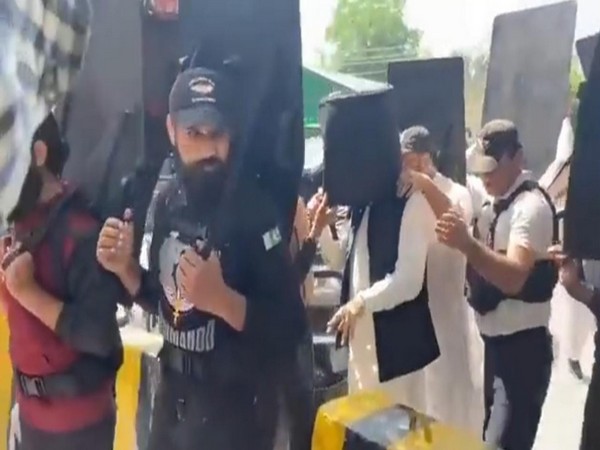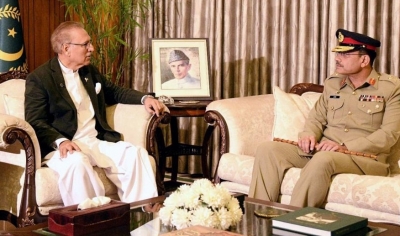Imran Khan’s survival is partly due to the soft corner that some generals have for the former prime minister. In a real sense, the incumbent Army Chief Gen. Asim Munir’s task is now to stitch up unity within the ranks of the top echelons of the Pakistan Army and ensure that Imran Khan is kept out of the electoral contest expected to be held this year … A special report by Dr Sakariya Kareem
That former Prime Minister Imran Khan has managed to survive thus far in the turbulent landscape of Pakistan’s politics is a function, both of his tenacity and continued support from elements within the Pakistan Army. This is the reason why Imran Khan remains out of judicial confinement. The political drama surrounding the former PM recently witnessed a bizarre incident when he was seen outside a court in Lahore wearing a makeshift bulletproof helmet that looked like the black hood, fully guarded by four men with bulletproof shields and an aide guiding him to an anti-terror court for seeking an extension in bail in three of the scores of cases registered against him.

The Pakistan Tehreek-e-Insaf (PTI) chief was shot in the leg during a political rally in Wazirabad (November 2022) and since then travels under tight security. Imran Khan knows that his battle against the establishment could well lead to his assassination, especially with Asim Munir as the Army Chief.
A video of the same has gone viral on social media and show security guards holding up bulletproof shields around him, and Imran Khan wearing a makeshift bulletproof helmet resembling a black hood pulled over the head of a death row prisoner before hanging. An aide can be seen in the video guiding Imran Khan towards the court because it was difficult to see through the slit in the bulletproof helmet, according to Geo News. Khan entered the Anti-Terrorism Court(ATC) under heavy security because the judges had made his appearance in person for the appeal for an extension of bail as a condition of his release on bail. Notably, Imran Khan was granted interim bail by a Lahore ATC in three cases and his bail was extended till 13 April 2023 in the three terrorism cases registered against him.
According to Geo News, Khan is currently embroiled in more than 140 cases related to terrorism, murder, attempted murder, and blasphemy that the PMLN-led coalition government has registered against him over the past 11 months. Earlier, in March, the Lahore High Court LHC granted protective bail to Imran Khan in the ATC case and directed him to approach the relevant court in this matter. Imran Khan, who arrived at the court, wrote in his petition seeking interim bail that he wants to be involved in the probe but fears arrest by the police, reports The News International. Khan had been granted bail by the ATC with a condition that he post surety bonds of PKR 100,000 in each instance and cooperate with the investigation and appear at all scheduled hearings. While Imran Khan is currently out on bail, the incumbent government and deep state would ideally like to see him behind bars. The objective is to ensure that he does not fight the elections due to be held sometime later this year.

One of the reasons why Lt. Gen. Asim Munir was chosen to be the Army Chief after Qamar Bajwa was because when the former was DG, ISI, he had objected to some of the activities of the then Prime Minister Imran Khan’s wife. An angry Khan ensured Gen. Munir’s ouster from the ISI in haste. However, while Munir is against Imran, there are others within the establishment who are in his favour. One of them is Lt. Gen. Faiz Hameed, also a former DG ISI.
According to Pak media reports, General Hameed was involved in an attempt to prevent Gen. Asim Munir from becoming the Army Chief. The bottom-line is that Gen. Hameed played a key role in supporting and sustaining the Imran Khan government, which is why Imran Khan was keen to appoint Hameed as the COAS.
General Qamar Javed Bajwa has admitted in a recent interview that he had ignored a few of Hameed’s “unauthorised acts” as DG, ISI. Hameed was part of a Whatsapp group of Generals, judges, bureaucrats, and political leaders which manipulated events in the country. The latest episode, part of an unravelling series of stories, is related to an attempt by Gen. Hameed to block the possible selection of Gen. Asim Munir as the new chief. Hameed along with four other Generals were in the queue for the top post in the Pakistan Army.
An investigation carried out by Pakistan’s central citizen database, National Database and Registration Authority (NADRA), found that some senior officers of the agency were involved in extracting personal information about Gen. Munir’s wife and international travels of the family. During this time, a junior data entry operator at NADRA, Farooq Ahmed, allegedly accessed the data of a female family member of Gen Asim Munir Shah and collected the family’s details and identity card numbers.

This data was later used in the Federal Investigation Agency’s (FIA) Integrated Border Management System (IBMS) to track the international travel destinations of the family. The News International reported that the NADRA leak was calculated to block the chance of Gen. Munir becoming the new COAS. Further, he was projected as a Shia officer. The NADRA inquiry was ordered by Prime Minister Shahbaz Sharif after he got a communication from Saudi Arabia that attempts were being made to label one of the main contenders for the COAS, General Munir, as a Shia officer and hence not fit for the top military position.
The Dawn newspaper reports that conspiracy occurred in October 2022, when five senior Lt-Gen’s, including Munir and Hameed, were being mentioned as possible contenders. The inquiry into the data leak was supervised by Brigadier (Retd.) Khalid Latif, a senior NADRA officer. He was later found to be a close aide of Lt. Gen. Faiz Hameed. Latif was then replaced by another senior officer, Ali Javaid. The inquiry found two NADRA officers, Khalid Anayatullah and Amir Bukhari, as the key players behind the data leak, both disclosed that close relatives of the contenders for COAS had sought their help in accessing the data. The other senior General allegedly involved in the conspiracy was Lt. Gen. Azhar Abbas, the then Chief of General Staff.
Abbas had the support of other officers belonging to the Kakul Military Academy who were opposed to Munir as he had completed his training from the Officers Training School (OTS). Abbas is said to have objected to Gen. Bajwa who in turn conveyed the same to Prime Minister Shahbaz Sharif. Former PM Nawaz Sharif who was also consulted point blank refused to entertain anything against Gen. Munir. Gen. Abbas reportedly then threatened a coup and the government quickly approached Lt. Gen. Shahid Shamshad and offered him the post of Chairman Joint Chiefs of Staff Committee (CJCSC). Lt. Gen. Shamshad was at that time commanding 111 Brigade, also known as the ‘coup brigade.’ Investigations by Pakistan’s Intelligence Bureau reveal that other officers involved in the conspiracy were the former head of ISI Islamabad office, Colonel (Retd.) Liaquat Ali Waseem and Lieutenant Colonel (Retd.)

Asif Mehmood, both close to Lt. Gen. Faiz Hameed. Waseem and Mehmood were involved in accountability cases against PML-N leaders on behalf of Hameed. The extent of Lt. Gen. Hameed’s network of conspirators can be gauged from the group’s involvement in the leakage of sensitive meetings at the Prime Minister’s Office (PMO) between Prime Minister Shahbaz Sharif, his principal secretary Dr. Tauqeer Shah, Maryam Nawaz, and other senior ministers. These conversations took place in September 2022. During the investigation by the Intelligence Bureau, the main culprit was found to be the Prime Minister’s Aide-De-Camp (ADC), Major Arsalan. Arsalan was ADC to Lt. Gen. Hameed when he was DG, ISI. When Hameed was transferred to Peshawar, he positioned Major Arsalan as the then Prime Minister Imran Khan’s ADC. By the end of November, Hameed knew that he was under scrutiny and therefore, decided to retire prematurely from the Army. In March 2023, the Shahbaz Sharif government initiated a corruption probe against Gen. Hameed.
It is interesting how former PM Imran Khan built a network within the Pakistan Army to ensure his survival. However, eventually, the Army realised that Imran had become a liability and needed to be discarded. This suited the Army Generals, except for Gen. Hameed and his colleagues. Imran Khan’s survival today is therefore partly, due to the soft corner that some generals have for the former prime minister. In a real sense, the incumbent Army Chief Gen. Asim Munir’s task is now to stitch up unity within the ranks of the top echelons of the Pakistan Army and ensure that Imran Khan is kept out of the electoral contest expected to be held this year.
ALSO READ: Imran among PTI leaders booked for sedition

